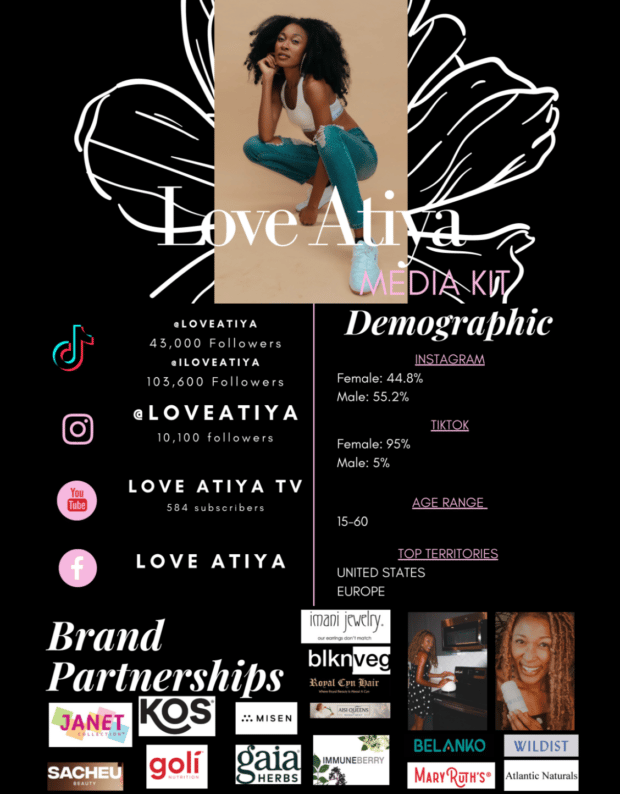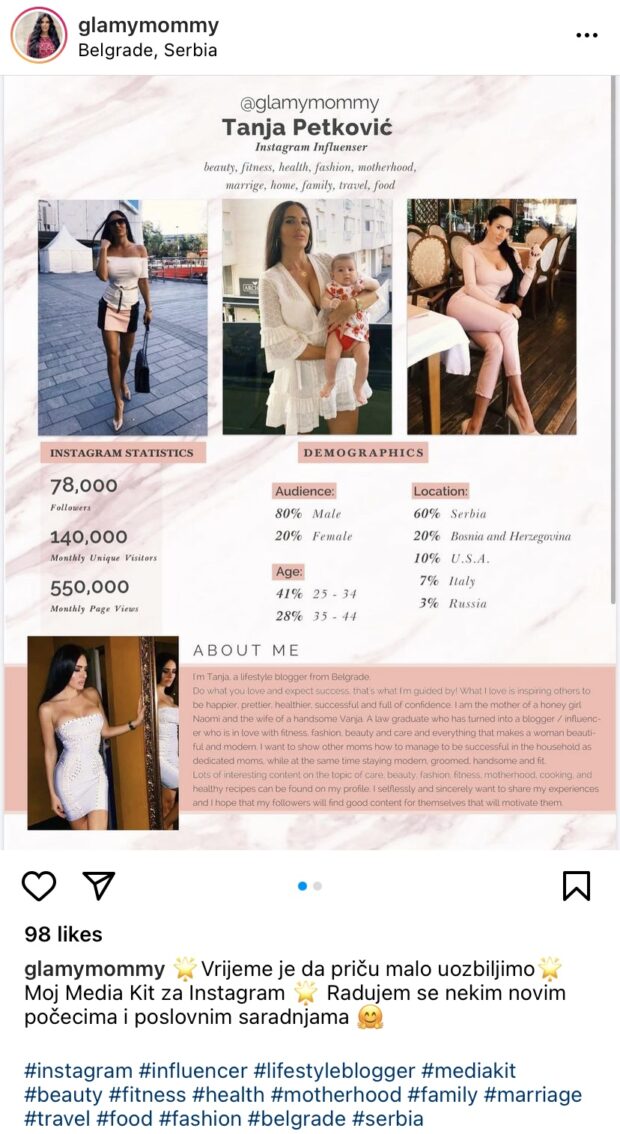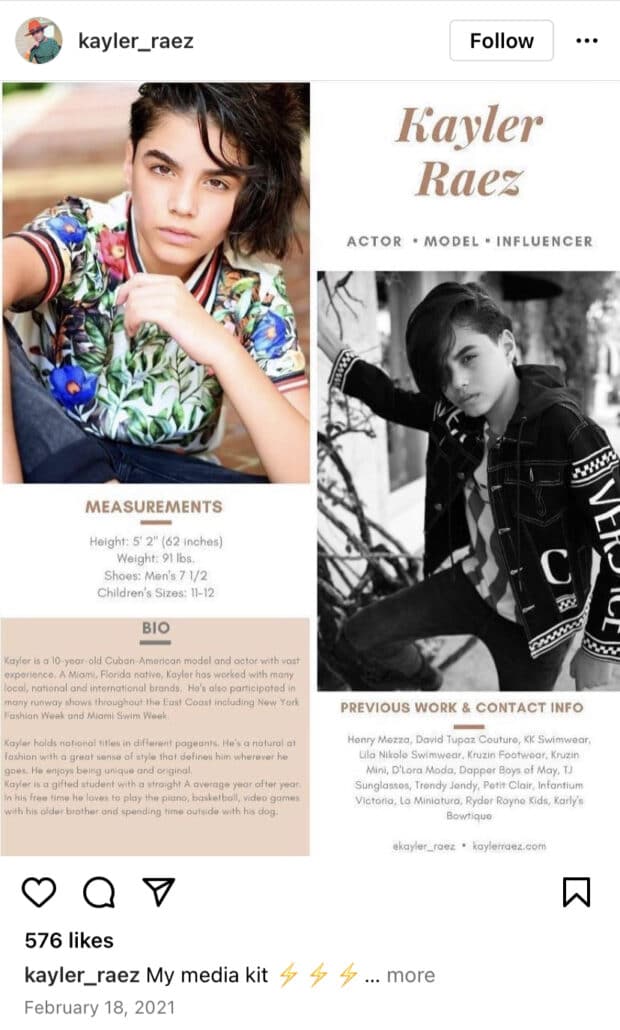How do you tell if gold is real? Bite it. How do you tell if an influencer is legit? Check out their media kit. These are rules for life.
Having an informative, engaging, and impressive media kit is one of the best ways to land professional deals as an influencer. And knowing how to spot a great media kit is one of the best ways to form meaningful partnerships as a business.
So for folks on both sides of influencer marketing, here’s everything you need to know about creating an effective media kit.
Bonus: Download a free, fully customizable influencer media kit template to help you introduce your accounts to brands, land sponsorship deals, and make more money on social media.
What is an influencer media kit?
An influencer media kit is a document that influencers and content creators share with brands when discussing potential partnerships.
A good media kit should:
- Showcase your strengths
- Prove that you have an engaged online following (e.g. by including follower stats)
- Highlight the kind of value you can bring to a potential client
Simply put, the purpose of a media kit is to convince others (businesses, collaborators, and other influencers you could potentially partner with) that you have the followers, the strategy, and the confidence it takes to boost their presence online—and in turn, make them money.
Ideally, a media kit should be short and sweet (like a resume). It’s a visually appealing and concise snapshot of your online presence and achievements.
Media kits are usually exchanged in a PDF or slideshow format—but again, if it’s a slideshow it should be short! Think of it more like a highlight reel than a feature film.
Let’s get rolling.
5 reasons you need an influencer media kit
1. Come across as more professional
We’ll give you advice later in this post on how to make your media kit awesome—but the fact is, having one at all will make you appear more professional as an influencer.
Just like having an email with your own domain name or ordering an appetizer for the table, media kits make you look like a boss: they show you’re prepared, experienced and eager to collaborate.
2. Land better brand deals
Professional media kits lead to professional brand deals — and you’re more likely to score a good partnership with a good media kit.
Think about it: if your kit shows the value you can bring, you have more bargaining power when it comes to negotiating fees. Being able to give concrete examples of the good you’ve done for other businesses is an asset to landing a great new deal.
3. Communicate more efficiently
Sometimes, working in social media can be a numbers game (and no, we’re not talking about how many followers you have).
If you’re reaching out to lots of businesses about potential brand deals, or having lots of brands reach out to you, you’ll want a media kit at the ready. Your kit is a one-step hack for showing potential partners everything they need to know about you, and having one means you won’t have to go back and forth emailing and DMing to communicate the same information over and over again. Just send them a comprehensive media kit and you’ll only have to deal with follow-up questions.
4. Set yourself apart
Your media kit sets you apart from other influencers as much as your content does. Being creative and concise in your kit shows brands your skills in action, and you can use your media kit as an opportunity to stand out from the crowd.
Think Elle Woods perfumed pink paper, but digital. What, like it’s hard?
5. Gain confidence
Anyone can experience self-doubt at any point in your career, but chances are if you’re a micro- or nano-influencer (10,000 to 49,999 followers or 1,000 to 9,999 followers, respectively) you’re suffering from a bit of imposter syndrome.
Don’t worry too much. Simply putting together this kit, which is basically a beautiful celebration of everything that makes you fabulous, can help you get in the right mental state for getting out there and getting that bread.
What should be included in an influencer media kit?
A short bio
This is arguably the most important part of your kit—it should come first, as it will shape the viewer’s first impression of you as an influencer.
Include your name, where you’re based, and what you do—your interests, values and experience are important to communicate here.
A list of your social media accounts
A list of your accounts across social media platforms (complete with links!) is an essential component of a media kit. Hopefully, folks looking over your kit will want to see you in action, so providing them with a clear route to your content is key.
Your performance stats
As much as we believe that quality beats quantity when it comes to social media, the stats still matter. Hard numbers will help your potential clients decide whether your reach and engagement align with the brand’s targets.
Make sure you include:
- Your number of followers. This is important, but not quite as informative as…
- Your engagement rates. This shows how many people actually interact with your content (and proves that you haven’t bought all your followers). For an in-depth guide on engagement rates and other stats that matter, check out our guides to analytics on Instagram, Facebook, Twitter and TikTok.
- General audience demographics. What is the gender breakdown, and where does your audience live? How old are they? This will help businesses determine if there’s overlap between your followers and their target audience, and will inform whether or not you’re the right fit for their brand.
You can also include:
- The average number of likes/comments you get on posts
- How much content you post in an average week
- How much your account and following has grown in a certain amount of time
Successful brand deal case studies
This is the part where you shamelessly brag.
Include as many numbers as possible when you’re exhibiting case studies, including how long campaigns lasted, how the stats for the brand you partnered with changed, and any concrete data you can give for the actual number of people you sent their way.
Affiliate programs are also great for this. If, for example, you gave your followers a unique code that they could use for a discount at a certain vendor, your kit should include how many people used your code (and how much money you brought in for the brand).
Obviously, you’ll want to be as positive as possible when referring to other brands that you’ve partnered with. Now is the time to be upbeat and inspiring.
Your rates
Your rates should come at the end—that way, you’ve already shown your potential client what you’re worth it.
Whether or not you should include your rate card in your brand kit is controversial in the influencer and content creator community. Here are some things to consider.
A positive aspect of being upfront about pricing is that it shows brands that you expect to be paid for your work (free products are cool, but cash is better). Because it’s a relatively new and creative industry, it’s easy to get wrapped up in a contract that doesn’t serve you economically, and being clear about rates helps to prevent that.
That said, promising rates before discussing the nature of the work you’re doing is risky. Phrasing your prices as a “suggested” or “estimated” rate helps give you some more bargaining power.
Alternatively, you can not include rates in your media kit and instead send them separately when requested—that way you can adapt your prices for different companies.
Photos
Odds are, much of the work you’ll be doing as an influencer is visual—it’s what grabs people’s attention and inspires them to stop scrolling. Be sure to include a few high-quality photos in your media kit to exemplify your photography skills and your overall aesthetic.
Photos are a nice visual break to a reader, and they also give brands a little taste of what you do.
Contact information
This one should go without saying — when creating your media kit, include contact details to make sure brands know exactly how to get in touch with you!
How to create a stand-out influencer media kit
Do your research
If you’re reading this, you’re already on this step. Go you! Take a look at the media kit examples included in this blog post and do some digging into other influencers in your community. Find what stands out to you and determine why—then you can recreate it with your own personal flavour.
Collect your data
Take notes of all your stats and case study numbers, no matter how big or small or successful or not successful. Remember to pay special attention to stats that show engagement rather than just numbers.
Hootsuite Analytics will be your hero here—the platform gives you the info from every app (Instagram, TikTok, YouTube,Facebook, Twitter, LinkedIn, and Pinterest!) in one place.
Learn more about Hootsuite Analytics:
Cut any data that doesn’t serve you
Honesty is the best policy, but if you feel certain stats aren’t representative of how great you are, you don’t have to include them.
Focus on the positives and how much you’ve grown, and leave out anything that won’t help you get a deal. Make sure you still have those stats written somewhere, though, as brands might ask, and you definitely don’t want to lie (it’s morally bad, yeah, but getting called out for that is also super humiliating).
Plan your look
Put your art hat on and plan what kind of vibe you’re looking for —warm or cool, maximalist or minimalist? You can draw inspiration from art you like (album covers, clothing brands, etc.) but make sure the style you settle on aligns with your content. Have a color palette in mind.
Use a template
If you’re an art whiz, the layout part of a media kit should be a breeze. But a template is an excellent start for those less editing-savvy, and many online templates rock: they’re totally customizable and don’t look cookie-cutter at all. So use the support, and take the template—if not to use, just to inspire.
Bonus: Download a free, fully customizable influencer media kit template to help you introduce your accounts to brands, land sponsorship deals, and make more money on social media.
Our team has created this free, fully customizable media kit template to make getting started easier:
Bonus: Download a free, fully customizable influencer media kit template to help you introduce your accounts to brands, land sponsorship deals, and make more money on social media.
Influencer media kit examples
Now that we’ve covered all the basic elements of a media kit, here are a few examples of well-designed, effective media kits.
It’s important to remember that there’s no one way to make a media kit – each kit will look a little different from the next. What’s important is that they are easy to read, friendly to the eyeballs and informative.
Source: Love Atiya
This influencer’s kit starts with her handles, some stats and demographic data. She also has logos from different brands she’s partnered with in the past.
Source: @glamymommy
This Instagram influencer’s kit includes the number of monthly unique visitors she has on her social media, which is a great way to show brands the growth potential of your audience. Her bio includes some information about her education and family, and it’s super clear who she is: brands that market to new moms or in the fitness or beauty industry would be a good match for her.
Source: @kayler_raez
This influencer and model’s media kit includes his measurements (good if you’re seeking out contra, as brands can send you garments that properly fit). His bio focuses on his modeling work and his “Previous Work” section is a rapid fire of brands he’s collaborated with.
Influencer media kit template
Bonus: Download a free, fully customizable influencer media kit template to help you introduce your accounts to brands, land sponsorship deals, and make more money on social media.
Grow your online presence with Hootsuite. From a single dashboard, you can schedule and publish posts directly to Instagram and TikTok, engage your audience, measure performance, and run all your other social media profiles. Try it free today.
Do it better with Hootsuite, the all-in-one social media toolkit. Stay on top of things, grow, and beat the competition.
The post How to Create an Influencer Media Kit in 5 Steps [TEMPLATE] appeared first on Social Media Marketing & Management Dashboard.
![How to Create an Influencer Media Kit in 5 Steps [TEMPLATE]](https://localseoresources.com/wp-content/uploads/2022/06/Influencer-media-kit-example-1-620x794.png)







Recent Comments